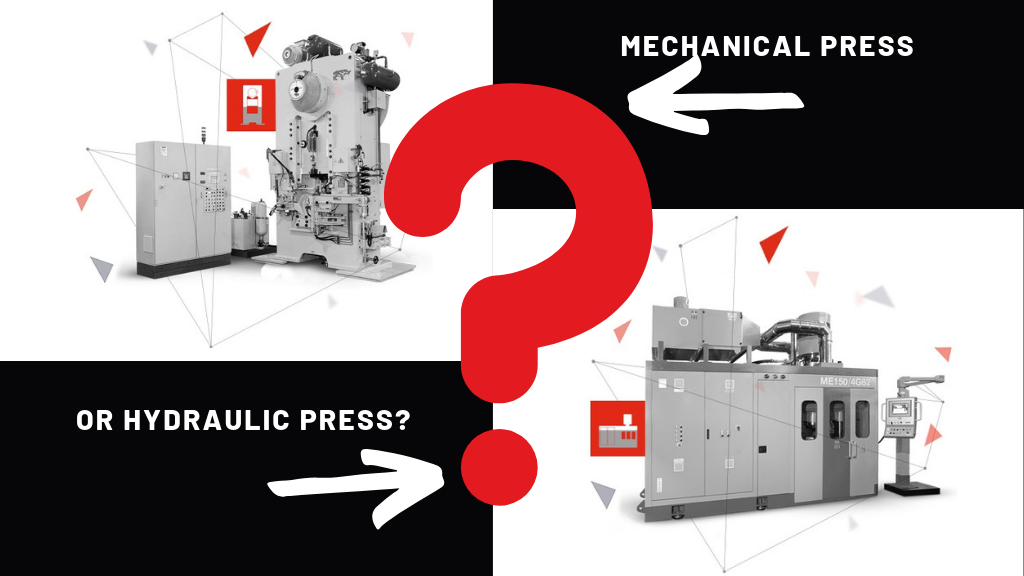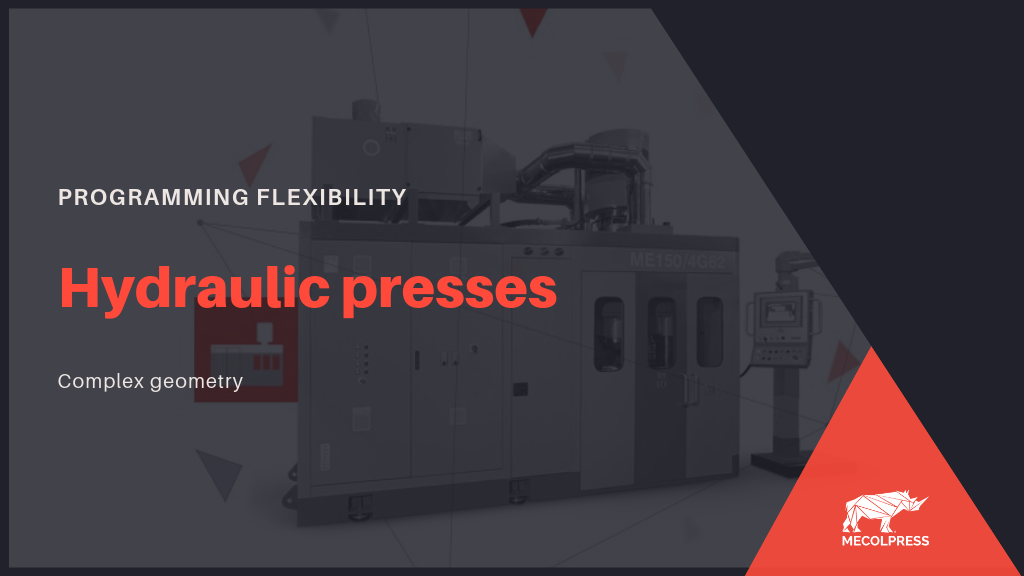
Mechanical press or hydraulic press?
Thanks to the long experience as press manufacturers, Mecolpress can offer to its customers a wide choice of mechanical and hydraulic presses for hot forging and our sales department team can suggest the most suitable machine for the realization of a specific geometry.
Differences between mechanical press and hydraulic press
The mechanic press develops the movements necessary for forging thanks to mechanical connections between the ram and the horizontal coring system of the parts. The upper die close against the lower one and the punches enter laterally. The movements of the mechanical components are therefore all connected with each other and their planning results to be a little bit restricted because if you adjust the movement of a component, you will automatically modify the other ones, as well.
The movements of the components of the hydraulic press are adjusted by hydraulic cylinders instead and you will have an independent control on each axis. This implicates a superior programming flexibility because you can operate on the single components and obtain a better material flow management inside the die.
When it is better to choose a mechanical press
The mechanical at continuous cycle presses for metals hot forging have a higher productivity compared to the hydraulic presses, and this certainly represents an advantage.
There are vertical forged parts, such as the straight junctions or the nuts, that due to their shape are very suitable to be forged by high productivity mechanical presses.
When it is better to choose a hydraulic press
The hydraulic presses allow a major control on the movements of the single components and are more suitable for the realization of parts of complex geometry, such as the slide gate valves. The punches that contribute to the realization of the part are indeed independent and are generally four, placed at 90° of distance from each other, but one or even two punches can be set up with a variable angle of entry, for example of 45° compared to the adjacent one. This implicates a higher flexibility and the possibility to realize some very complex shapes maintaining a high-quality standard.
Another characteristic of hydraulic presses for metals hot forging is the fact that they need less structure inside the productive area because they do not need to be placed on a pit, that is compulsory for the mechanical presses. The positioning of the hydraulic press on simple floor allows a higher flexibility in the factory layout.
The best choice? Ask Mecolpress!
The choice to buy a mechanical or a hydraulic press is almost exclusively made based on the shape of the part to be forged and not based on the material. Both the presses typology forge indeed different types of metals. The only case in which the material can be a decisive factor refers to steel productions that often require the use of a screw press because of the high tonnage.
Mecolpress offers excellent mechanical and hydraulic presses according to the part geometry that the customer wants to realize, and suggests the best and most performing press, that can indeed optimize the production and sparing on the costs.
If you want to receive information regarding our hot forging presses, you can write to: sales@mecolpress.com

Mecolpress hydraulic presses: features and advantages
Mecolpress boasts a wide range of hydraulic presses of different tonnages, ideal for the realization of hot forged parts with complex geometry. The presses are equipped with a Mecolpress proprietary software, “Calipso”, that allows to monitor the entire productive cycle of the hydraulic press according to numerous parameters.
Features of hydraulic presses
Hallmark of every hydraulic press is the programming flexibility. Since the ram and the punches are independently controlled by hydraulic cylinders, this allows to carry out some corrections during the working cycle to remedy some eventual defects by acting on the movement of a single component through software.
Hydraulic presses can hot forge different materials including brass, copper, aluminum, steel and titanium alloys.
Range of Mecolpress hydraulic presses
Mecolpress offers to its customers a wide range of presses with a die closing force that currently goes from 100 to 500 tons and a minimum punch force of 30 tons that can arrive till 350 tons.
Moreover, our hydraulic presses are provided with a loading arm for warm billets and with an unloading arm for the forged part. Based on the customer’s needs concerning the layout for the hot forging production line, the arms can be placed on the same side and working in sync, otherwise placed on the opposite sides and working autonomously. Thanks to “Calipso” software developed by Mecolpress and installed on every hydraulic press, the press can detect which parts are not in compliance with the programmed parameters, and these parts will be automatically separated from the others by the unloading arm, flowing into a box for wastes.
This management allows to optimize the checks and to save time on the productive cycle.
Possible configurations of a hydraulic press
Mecolpress hydraulic presses can be set up in a custom-made way according to production needs expressed by the customer. For example, one or two punches can be placed with an entry angle different from the classic 90°, allowing the realization of particularly complex shapes such as, for example, Y-junctions and filter bodies.
Further possible configurations are:
- the addition of a fifth vertical punchthat operates under the die,
- the loading of one or two billets at the same time till a maximum of four,
- the addition of pyrometers for billet temperature detection,
- the application of extra sensors on the punches for both physical and mechanical data collection that are then sent to the PLC and that allow to better monitor the production cycle.
Indeed, the sensors always check the movement carried out by the punches during the stroke and it is possible to obtain a representation of the different acceleration and deceleration phases. This real time analysis allows to notice eventual problems and to understand if these derive, for example, from the die or if these are of hydraulic or mechanical type.
In this way also the Mecolpress service team can intervene in a more to the point and prompter way, reducing the machine stop costs.
